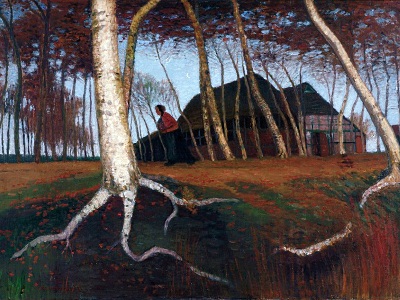God wants to give our inward life an indestructible harmony that will work outward in mighty melodies of love. The power that comes from gathering our inner energy is a power for taking action. When our individual hearts are gathered in this way, we will join together as a gathered people – a people whose active work makes God’s reign manifest as justice, peace, and joy in the Holy Spirit (Rom. 14:17).
This is the life task to which Christ calls us. Yet today we must first rediscover the importance of deepening our inner life in stillness, otherwise our work will become empty and mechanical, leaving our strength for action sapped at the core. Our spiritual life is watered and made fertile by the holy wellsprings of the inward world, but these will dry up if the stillness within us is lost. Like people dying of thirst, today’s overburdened souls long for a quickening of their inner life, sensing that without it they will come to ruin (Ps. 42:2–3). The inward power that wells up in the silent stillness in which God himself can speak and act brings us from downfall and death to resurrection and life – a life that pushes outward in streams of creative spirit yet never loses itself in the external world. This strength, which we may call “active stillness,” leads believers to a task in the world. It’s a task that does not allow them to be conformed to the world, but that also never lets them fall inactive.
The distress of our times makes it unthinkable to retreat from society, willfully blind to the urgent work that calls out for our help. Seeking spiritual detachment must not steer us toward inner and outer isolation from our fellow human beings. (In this respect the sayings of the medieval mystic Meister Eckhart, who wrote extensively on the great value of detachment and who in many ways understood the inner life better than anyone, can easily be misleading.) Thankfully, the rapid mechanization of today’s global economy no longer permits such pious selfishness. More than in earlier times, we are protected from deceiving ourselves.
All the same, in our outer activity we will feel a loss in vitality and effectiveness whenever the detachment we strive for has not penetrated to the inmost source of our creative energy. When this power, which springs from inner detachment, is at work in human beings, it will gather together a believing people as a living community. The common life of this people will be characterized both by complete surrender and (as a result) by the most dedicated activity. Their love for all humankind will then press outward from solitude to the very ends of the earth – without ever losing its focal point in the gathered fellowship that remains its source of strength.
To a responsible conscience, the only justification for fleeing the confused and hectic whirl of contemporary culture so as to withdraw into the inward self is if doing so will increase our fruitfulness. The goal must be to unite with eternal powers in order to gain a strength of character that is ready to be tested in the stream of the world and is equipped to meet the demands of our day. Our watchword is not “Retreat!” but rather “Gather for the attack!”
That is why we may never withdraw from the torrent of present-day life into a spiritual selfishness that chills our love in the face of suffering and guilt. Otherwise our inner detachment will have become far more cold-hearted and unjust than the injustice of the world. Unless we help bear the world’s distress and guilt, we will fall prey to a lifeless lie: to eternal and temporal death. Those who try to chop life in half, caring only for the inner needs of others but not for their outer distress, will soon find that they have lost their life’s inner half as well – the very part they thought they were securing. Such people have forgotten Jesus Christ, who bore people’s outer and inner needs in equal measure, since in his eyes the two are an inseparable whole (Matt. 9:4–7).
We must participate in the life of today’s world with an attitude of militant love. But we can do so only if we are ready to respond with every fiber of our being to the demands that will be made on our labor. With every drop of our hearts’ blood we are to share in suffering the world’s pain, and so join in struggling with all our vigor to overcome this pain (Gal. 6:2). We will discover how to do this in stillness and in silence.
The experience of God means strength for action. Love is always expressed in living deeds; to experience God is to experience his power as living love. Liberation from all unjust, loveless, and self-willed activity releases an abundance of powers that overflow in fruitful works of love. We experience the love of God inwardly, but it manifests itself outwardly. The more our faith increases in knowledge, experience, and strength, the more we will be compelled to do the works of love (Eph. 4:13). To experience God is to be overpowered by love.
Today, the after-effects of the Great War and the current state of society call for the kind of dedication that lives only in Christ – in the heart of the powerful God of Jesus Christ. Only a heart filled with the superior power of God’s love will be able to confront the pain and suffering around it. Only in the strength of an omnipotent God will we be able to carry the burden of historical responsibility laid on us, a burden beyond all human strength. The reign of God and the gospel of Christ will penetrate our devastated world only through love, which is paramount over every other power or force.
In the midst of the increasing violence, injustice, cruelty, and cold-heartedness of our time, love must be revealed: a love that towers above all earth’s mountains, that shines more purely and brightly than all the stars in the sky, that is mightier than all earthquakes and volcanic eruptions, that is greater than all world powers and rulers, that works more powerfully in history than all catastrophes, wars, and revolutions, that is more alive than all life and natural forces in creation. Above everything in nature and within all history, love shows itself to be the ultimate power of the Almighty, the ultimate greatness of his heart, the ultimate revelation of his spirit.
The experience of God is love (1 John 4:8) – love that overcomes everything that opposes it. Love is the energy of the new creation, the spirit of God’s coming reign, the sole element in the new world he is building (1 Cor. 13:13), and the herald of a new era. It is the organic strength of unity, the shaping of a new humanity. This love becomes reality in the church of Jesus Christ, through its unity (Eph. 2:14–22). The church is built up through gathering people together; whoever does not gather with the church scatters. The church's life consists in uniting; whoever stands apart from this unity remains in death. Life comes through the Spirit of Jesus Christ, who establishes the church’s task in the midst of this fallen age. In the church we may experience God through Christ. In this fellowship of perfect love, God’s Spirit brings the perfect justice of Christ’s kingdom to this earth.
Adapted from Inner Land: A Guide into the Heart of the Gospel (Walden, NY: Plough, 2019–2021).
Article edited for length and clarity.


